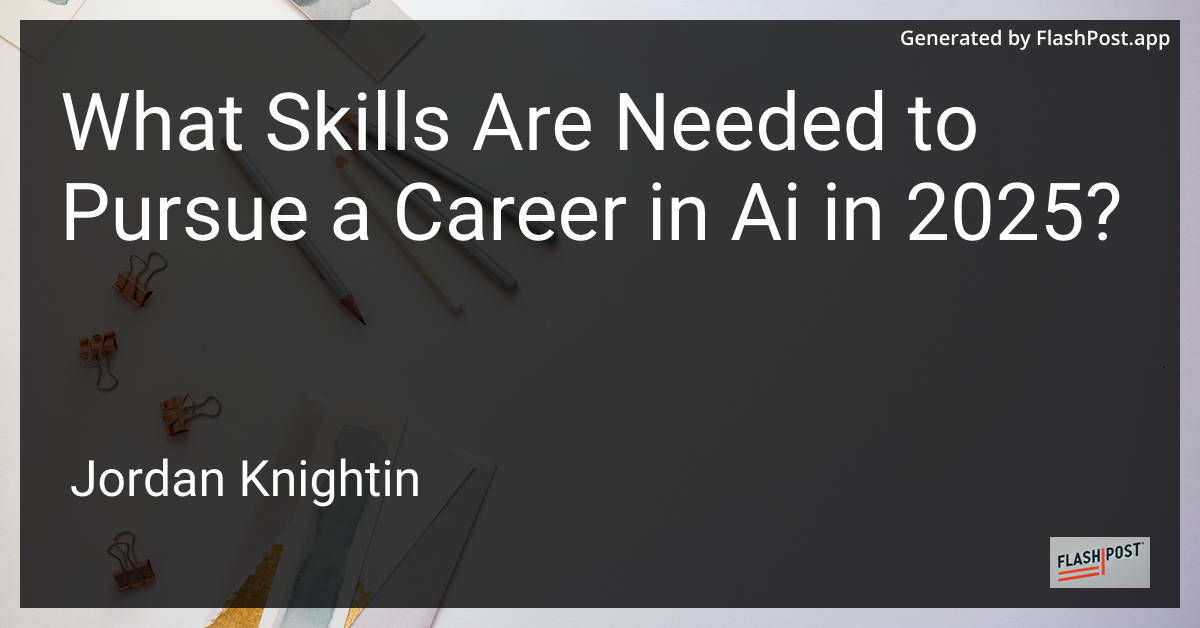

What Skills Are Needed to Pursue a Career in Ai in 2025?
The rapid evolution of artificial intelligence (AI) continues to reshape industries and create a demand for specialized skills. By 2025, pursuing a career in AI will require a diverse set of competencies in technology, mathematics, and soft skills. In this article, we explore the essential skills needed to excel in the AI landscape of the future.
Technical Skills
1. Programming Languages
A strong command of programming languages is foundational for any AI career. Languages like Python, R, Java, and C++ are commonly used in AI development. Python, in particular, is favored for its simplicity and extensive libraries, such as TensorFlow and PyTorch, which are crucial for machine learning and deep learning projects.
2. Machine Learning and Deep Learning
Understanding machine learning (ML) algorithms and deep learning frameworks is vital. Emerging AI professionals should be proficient in supervised, unsupervised, and reinforcement learning, alongside techniques like neural networks, natural language processing, and computer vision.
3. Data Analysis and Statistics
AI relies heavily on data. Skills in data analysis and statistical methods are essential for transforming raw data into actionable insights. Knowledge of tools such as Pandas, NumPy, and data visualization libraries will enable AI practitioners to preprocess and analyze data effectively.
4. Cloud Computing
Cloud platforms like AWS, Google Cloud, and Microsoft Azure offer resources for training models and deploying AI solutions at scale. Familiarity with cloud computing concepts will allow AI professionals to leverage these platforms efficiently.
Mathematical Skills
5. Linear Algebra and Calculus
A solid understanding of linear algebra and calculus is essential to grasp the mathematical foundations of AI algorithms. These areas of mathematics are crucial for comprehending how algorithms process and analyze data.
6. Probability and Statistics
Proficiency in probability and statistics is needed to build models that can make predictions and decisions based on data. These skills underpin many AI techniques, including Bayesian networks and inference.
Soft Skills
7. Problem-Solving and Critical Thinking
AI professionals must be adept at breaking down complex problems and devising innovative solutions. Critical thinking skills are crucial for evaluating algorithm performance and optimizing models for better results.
8. Communication
As AI applications often involve cross-functional teams, effective communication skills are necessary to convey technical concepts to non-technical stakeholders. Being able to articulate ideas clearly enhances collaboration and project success.
9. Adaptability
The AI field is characterized by rapid advancements and changes. Flexibility and a willingness to continuously learn and adapt to new technologies are essential traits for anyone pursuing a career in AI.
10. Domain Knowledge
Understanding industry-specific requirements and challenges can give AI professionals a competitive edge. Whether it’s healthcare, finance, or marketing, domain knowledge enables the creation of tailored AI solutions that address real-world problems.
Conclusion
Pursuing a career in AI in 2025 will require a blend of technical prowess, mathematical acumen, and soft skills. As AI technologies continue to advance, staying updated with the latest trends and continuously honing your skills will be crucial. For further insights into AI applications, explore the following links:
- Learn how to leverage AI for financial market prediction with artificial intelligence.
- Discover how to extract market insights through AI with artificial intelligence.
- Understand how AI technologies will function in 2025 with artificial intelligence technologies 2025.
Equip yourself with these key skills to thrive in the dynamic AI landscape and seize the opportunities of tomorrow.
